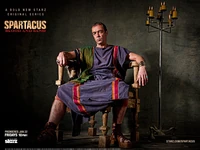- For the Season One episode list, see List of Episodes in Season One.
| This page uses Creative Commons Licensed content from Wikipedia (view authors). |
Spartacus: Blood and Sand is a Starz television series that premiered on January 22, 2010. The series focuses on the historical figure of Spartacus (played by Andy Whitfield), a Thracian gladiator who from 73 to 71 BC led a major slave uprising against the Roman Republic. Executive producers Steven S. DeKnight and Robert Tapert focused on structuring the events of Spartacus' obscure early life leading to the records of history.[1] The show has been rated TV-MA for graphic violence, strong sexual content, and coarse language.
On December 22, 2009, it was announced that the show was renewed for a second season before even premiering.[2] However, on March 9, 2010, IGN.com reported that the production of Season 2 has been delayed due to star Andy Whitfield being diagnosed with early-stage non-Hodgkin lymphoma.[3] According to the weekly New York magazine, due to the delay, Starz developed a six-episode prequel to Spartacus: Blood and Sand.[4]
It would later follow up with an official second season, Spartacus: Vengeance, following the role of Spartacus being granted to Liam McIntyre and premiered January 27, 2012.
Official Description of Spartacus: Blood and Sand From Starz[]
Betrayed by the Romans, forced into slavery, reborn as a Gladiator. The classic tale of the Republic's most infamous rebel comes alive in the graphic and visceral new series Spartacus: Blood and Sand. Torn from his homeland and the woman he loves, Spartacus is condemned to the brutal world of the arena where blood and death are primetime entertainment. But not all battles are fought upon the sands. Treachery, corruption, and the allure of sensual pleasures will constantly test Spartacus. To survive, he must become more than a man, more than a gladiator. He must become a legend.
Spartacus: Blood and Sand © 2009 Starz Entertainment, LLC. All Rights Reserved.
Synopsis[]
The story begins with an unnamed Thracian’s involvement in the war against the Getae in Roman auxiliary under the command of the Legatus, Gaius Claudius Glaber. Glaber, persuaded by his wife Ilithyia to seek greater glory, instead decides to confront the forces of Mithradates. The Thracian, feeling betrayed, leads a mutiny against Glaber, and returns to find his village destroyed. The Thracian and his wife Sura are captured by Glaber the next day; the Thracian is condemned to die in the arena for inciting mass desertion of the auxiliary, and Sura is condemned to slavery. The Thracian is sentenced to death, and is forced to fight four gladiators. However, he manages to kill the gladiators, and Senator Albinius commutes the prisoner's punishment to slavery. Since the prisoner's true name is unknown, Batiatus suggests to Albinius to name him "Spartacus", because he fought like the ferocious Thracian king of that name.
Seeing the Thracian's skill and popularity with the crowd, Lentulus Batiatus purchases him for training in his ludus' in Capua. Spartacus joins Batiatus’ gladiators under the tutelage of Doctore, a former gladiator but fellow slave. He is befriended by Varro, a Roman who sold himself into slavery in order to pay his debts and support his family. However, he is harassed by more senior gladiators, notably Crixus, an undefeated Gaul, and Barca, a Carthaginian. Soon, Spartacus learns that Sura was sold to a Syrian slave trader. Batiatus, who has been unable to control Spartacus during his first days of training, discovers the instrument of his taming, and persuades Spartacus to fight for his and Sura's freedom.
Spartacus' gladiatorial career is soaring but he is heartbroken when Sura is delivered to him mortally wounded, which is unbeknownst to him a power play by Batiatus in order to keep his loyalty. Crixus awakens from his wounds during the same fight which brought Spartacus stardom to find his status as champion of Capua stolen by Spartacus. Spartacus casts off his history as a Thracian, and forgets his dream of freedom, becoming content with life as champion. The turning point is when he is forced to kill his only friend in the ludus, Varro, when Ilithyia seduces the editor of an exhibition match in order to hurt Spartacus. While suffering from his wound in this match, he has fever dreams that lead him to discover Batiatus arranged Sura's death. Knowing that it is all or nothing when it comes to resistance of his enslavement, he resolves to "kill them all" and lead a revolt against the ruling house he once fought for.
Cast and Characters[]
- Andy Whitfield as Spartacus – a Thracian warrior who joins the Roman auxiliary to fight off his enemies. Later condemned to the arena, he becomes a gladiator in the ludus of Quintus Lentulus Batiatus in order to rescue his wife.[5] Producer Rob Tapert said that crew wanted an unknown actor to portray the role; while Whitfield has appeared in Australian television and film, Spartacus marked his United States debut.[6]
- Erin Cummings as Sura – the Thracian wife of Spartacus. She is enslaved after her husband rebels against the Romans.[7]
- John Hannah as Quintus Lentulus Batiatus – a Lanista and Spartacus' master. Ambitious and cunning, he craves higher social and political status and will do whatever he must to rise in the world of Rome.[8]
- Lucy Lawless as Lucretia – Batiatus' wife who matches her husband in both temperament and deceit.[9]
- Peter Mensah as Doctore/Oenomaus – A Numidian and former gladiator in the ludus. He now serves as Batiatus' trainer of gladiators.[10]
- Manu Bennett as Crixus – a Gaul, he is Batiatus' top gladiator and "Champion of Capua". He is known famously as the Undefeated Gaul.[11]
- Viva Bianca as Ilithyia – the beautiful and spoiled daughter of senator Albinius and wife of Glaber.[12]
- Nick Tarabay as Ashur – An Assyrian and former gladiator. His leg was crippled by Crixus in the arena so he now serves Batiatus as a bookkeeper and henchman.[13]
- Katrina Law as Mira – Hispanic slave in the House of Batiatus. She develops feelings towards Spartacus and he in turn holds her with affection.
Episode List[]
- 1. The Red Serpent
- 2. Sacramentum Gladiatorum
- 3. Legends
- 4. The Thing in the Pit
- 5. Shadow Games
- 6. Delicate Things
- 7. Great and Unfortunate Things
- 8. Mark of the Brotherhood
- 9. Whore
- 10. Party Favors
- 11. Old Wounds
- 12. Revelations
- 13. Kill Them All
Videos[]
Trailer[]
Clips and Interviews[]

Spartacus Blood and Sand - San Diego Comic-Con 2009 Panel STARZ-0
Reception[]
The premiere episode of the series set a record for Starz, with 553,000 viewers on their network, and another 460,000 on Encore, where the show was available only that weekend.[19] Critical reception of the first episode was varied; the review aggregate website Metacritic gave the show a score of 54 out of 100.[20] Ken Tucker of Entertainment Weekly gave it the grade B+, saying it "might prove to be the not-at-all-guilty pleasure of the season."[21] Barry Garron of the Hollywood Reporter suggested that with "such thin stories...it's small wonder that sex and violence are used to take up the slack."[22] Robert Lloyd of the Los Angeles Times wrote that John Hannah as Batiatus "keeps the show grounded with a persuasive portrait of a man engaged in a stressful daily business" and called Whitfield as Spartacus "handsome and buff and smart and beastly."[23]
Historical Context[]
The show opens with a disclaimer regarding the show's representation of the historical Roman society: "Spartacus depicts extreme sensuality, brutality and language that some viewers may find objectionable. The show is a historical portrayal of ancient Roman society and the intensity of the content is to suggest an authentic representation of that period." Producers Steven S. DeKnight and Robert Tapert have stated they use two historical consultants, with whom they exchanged scripts.[1]
- Most gladiators were not killed in the arena, but kept alive due to the high cost of slaves, including the months long training and upkeep of Gladiators.
- Roman legionaries are portrayed wearing lorica segmentata. However, the first attested use of this type of armor dates to around 9 BC,[24] six decades after Spartacus' revolt.
- Ilithyia's father is still alive, and she is depicted as able to purchase a slave. Patria potestas meant that a son or daughter could only own property once their father had died.[25] Also, Ilithyia has an allowance from her husband. Historically, the law prevented gifts from a man to his wife, including allowances. Regardless, anything in the possession of a woman with a living father would have belonged to him.[26]
- In the show 6 slaves are purchased by Batiatus for 100 denarii. The average price for a slave was 960-4000 denarii (with the cheapest known costing 75 denarii).[27]
- Historically, the revolt of Spartacus began with the rebels seizing kitchen utensils and using these as weapons.
- Spartacus calls himself a Thracian with obvious national pride, although that was a Greek term used for his people, and there is no evidence they used it for themselves.[28]
- Although Spartacus: Blood and Sand depicts Getae as clearly distinct from and enemies of "Thrace" historically Getae are Thracians. [29]
- The show also depicts the Getae as a barbaric tribe and the Maedi as civil. Historically, the Getae were the civil, peaceable tribe while the Maedi were the barbaric tribe. The historian Plutarch claims Spartacus came from this tribe, which wouldn't have been out of place since the majority of Romans saw Spartacus as a barbarian himself, and so the Maedi would have been the perfect tribe to claim he was from.
- Historically, it is believed that Spartacus spent one to two year within the Ludus while in the show he spends two years as a gladiator. However, there are speculations that he was enslaved over a decade earlier, or that he was among Marius and Crassus troops during the Social War, possibly as a part of their cavalry; Thracians were known for being horsemen.
- There is no historical context that Spartacus was a Champion gladiator.
Other than what can be said historically, Blood and Sand is mostly historical fiction, as very little can be said about Spartacus' time in Batiatus Ludus.
References[]
- ↑ 1.0 1.1 Interview: Steven S. DeKnight and Robert Tapert from Spartacus: Blood And Sand
- ↑ Template:Cite web
- ↑ Template:Cite web
- ↑ Template:Citation
- ↑ Template:Cite web
- ↑ Template:Cite web
- ↑ Template:Cite web
- ↑ Template:Cite web
- ↑ Template:Cite web
- ↑ Template:Cite web
- ↑ Template:Cite web
- ↑ Template:Cite web
- ↑ Template:Cite web
- ↑ Template:Cite web
- ↑ Template:Cite web
- ↑ Template:Cite web
- ↑ Template:Cite web
- ↑ Template:Cite web
- ↑ http://livefeed.hollywoodreporter.com/2010/01/spartacus-premiere-ratings-starz-/comments/
- ↑ Template:Cite web
- ↑ Template:Cite news
- ↑ Template:Cite news
- ↑ Template:Cite news
- ↑ M.C. Bishop (2002) Lorica Segmentata Volume I: A Handbook of Articulated Roman Plate Armour p.23 http://www.scribd.com/doc/3961788/Lorica-Segmentata-Volume-I-A-Handbook-of-Articulated-Roman-Plate-Armour
- ↑ Fier and McGinn, A Casebook on Roman Family Law, pg. 240, Owning and Possessing Nothing
- ↑ Fier and McGinn, A Casebook on Roman Family Law, pg. 130, No Gifts
- ↑ Harris, W.V (1980) Towards a study of the Roman slave trade. Memoirs of the American Academy at Rome 36: 136 n.46
- ↑ The Cambridge Ancient History, Volume 3, Part 2: The Assyrian and Babylonian Empires and Other States of the Near East, from the Eighth to the Sixth Centuries BC by John Boardman, I. E. S. Edwards, E. Sollberger, and N. G. L. Hammond ,ISBN 0521227178,1992,page 597: "We have no way of knowing what the Thracians called themselves and if indeed they had a common name...Thus the name of Thracians and that of their country were given by the Greeks to a group of tribes occupying the territory..."
- ↑ Herodotus. Histories, 4.93
External links[]
- Template:Official
- Spartacus Blood And Sand
- Template:Tv.com
- Template:Imdb title






